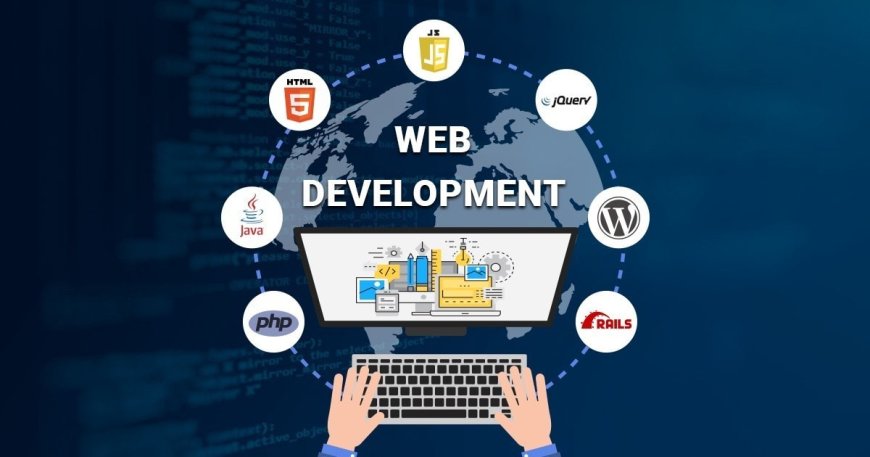Web Development Course
Web development is the work involved in developing a website for the Internet (World Wide Web) or an intranet (a private network).Web development can range from developing a simple single static page of plain text to complex web applications, electronic businesses, and social network services.

Web development Course Details:
Web development is a fast-paced and challenging career that focuses on creative problem solving and continuous innovation. As a web developer, you work with a multidisciplinary team of designers, other developers, and marketers to make your project a reality. Web development is the work involved in developing a website for the Internet (World Wide Web) or an intranet (a private network).Web development can range from developing a simple single static page of plain text to complex web applications, electronic businesses, and social network services.
Here are some courses you can consider:
-
Bachelor of Science (B.Sc.) in Web Design and Development: This is a three-year undergraduate program that provides comprehensive training in various aspects of web design and development. It covers topics such as HTML, CSS, JavaScript, database management, web hosting, and more.
-
Diploma in Web Designing: This is a one-year diploma course that focuses on the technical aspects of web design and development. It covers topics such as HTML, CSS, JavaScript, PHP, web hosting, and more.
-
Certificate Courses: There are various certificate courses available in web development that you can complete after 12th. These courses usually have a shorter duration than degree programs and focus on specific skills such as front-end web development, back-end web development, or full-stack development.
-
Online Courses: There are also many online courses available that you can take to learn web development. Some popular online platforms for learning web development include Udemy, Coursera, Codecademy, and edX.
Ultimately, the best course for you will depend on your goals, interests, and budget.
The eligibility criteria for web development courses after 12th vary depending on the course and institution. Here are some general eligibility criteria for popular web development courses:
-
Bachelor of Science (B.Sc.) in Web Design and Development: To be eligible for this course, you must have completed 10+2 or an equivalent examination from a recognized board. Some colleges may require a minimum aggregate score in 12th grade.
-
Diploma in Web Designing: To be eligible for this course, you must have completed 10+2 or an equivalent examination from a recognized board. Some colleges may require a minimum aggregate score in 12th grade.
-
Certificate Courses: The eligibility criteria for certificate courses vary depending on the institution and course. Generally, you need to have completed 10+2 or an equivalent examination from a recognized board. Some courses may also require basic knowledge of programming languages such as HTML and CSS.
-
Online Courses: Most online courses do not have any specific eligibility criteria. Anyone can enroll in these courses, regardless of their educational background.
To be a web developer, there are several requirements that you should fulfill:
-
Knowledge of programming languages: A web developer should have a good understanding of programming languages such as HTML, CSS, and JavaScript. They should also be familiar with server-side programming languages like PHP, Python, or Ruby.
-
Understanding of web development frameworks: Web developers should have a working knowledge of web development frameworks such as React, Angular, and Vue.
- Communication skills: Web developers often work in teams and need to be able to communicate effectively with team members, clients, and stakeholders.
-
Knowledge of web development tools: Web developers should be familiar with web development tools such as text editors, version control systems, and command-line interfaces.
-
Problem-solving skills: Web developers should have good problem-solving skills and be able to troubleshoot issues as they arise.
-
Familiarity with databases: Web developers should understand how to work with databases and how to write SQL queries.
Overall, becoming a web developer requires a combination of technical skills, problem-solving abilities, and a commitment to continuous learning.
-
Indian Institute of Technology (IIT) Bombay: IIT Bombay offers a range of web development courses, including certificate and diploma courses. The institute has a strong reputation for its engineering and technology programs and provides excellent resources for students.
-
National Institute of Technology (NIT) Surathkal: NIT Surathkal offers undergraduate and postgraduate courses in web development. The institute has a strong reputation for its engineering and technology programs and provides state-of-the-art facilities for students.
-
International Institute of Information Technology (IIIT) Hyderabad: IIIT Hyderabad offers undergraduate and postgraduate courses in web development. The institute has a strong focus on research and innovation and provides excellent resources for students.
-
NIIT: NIIT is a leading provider of web development courses in India. The institute offers a range of courses in web development, including full-stack development, front-end development, and back-end development.
-
Aptech: Aptech is a well-known provider of web development courses in India. The institute offers a range of courses in web development, including web design, front-end development, and back-end development.
-
Arena Animation: Arena Animation is a popular provider of web development courses in India. The institute offers a range of courses in web development, including web design, front-end development, and back-end development.
- Guru Nanak Dev University (GNDU),Amritsar
- National Institute of Design (NID),Ahmedabad
- Pearl Academy (PA), Delhi
- National Institute of Fashion Technology (NIFT), Delhi
- Indian School of Design and Innovation, Mumbai
- Web Designing Institute (WDI), Delhi
- Multimedia College of Animation (MCA), Pune
- Sangha Institute (SI), Pune
- Delhi Multimedia and Animation College (DMAC), Delhi
These are just a few examples of the top web development institutes in India.
Career options :
Web development is a promising career option with a bright future, especially for those who have completed their 12th. Here are some reasons why web development has a good scope after 12th:
-
Growing demand for web developers: With the increasing popularity of e-commerce and online business, the demand for web developers is increasing rapidly.
-
Variety of job opportunities: Web developers can work in a variety of industries, including technology, media, healthcare, finance, and more. They can also work as freelancers or start their own web development companies.
-
High salaries: Web developers can earn a good salary, especially with experience and skills in high demand.
-
Flexibility: Web development is a flexible career option, as it can be done remotely or from any location with an internet connection.
-
Constantly evolving field: Web development is constantly evolving with new technologies and trends, providing a dynamic and exciting career path for those who are interested in staying up-to-date with the latest developments.
-
web development is a promising career option with a good scope after 12th. It offers a variety of job opportunities, high salaries, and flexibility, making it a popular choice among students.
Web development is a fast-growing field with a wide range of job opportunities. Here are some of the job roles in web development:
- Web Designer: Web designers are responsible for creating the visual elements of a website, including the layout, color scheme, and typography. They use design software such as Adobe Photoshop and Sketch to create mockups and wireframes.
-
Front-end Developer: Front-end developers are responsible for building and maintaining the user interface of a website. They use HTML, CSS, and JavaScript to create web pages and make them interactive.
- UX Designer: UX designers are responsible for creating the overall user experience of a website. They conduct user research, create user personas, and design the navigation and interaction elements of a website.
-
Back-end Developer: Back-end developers work on the server-side of web development, building and maintaining the infrastructure that powers websites. They use programming languages such as PHP, Python, and Ruby, and work with databases to store and retrieve information.
-
Full-Stack Developer: Full-stack developers are responsible for both front-end and back-end development. They have a comprehensive understanding of all aspects of web development and are skilled in a wide range of programming languages and frameworks.
- Web Developer Manager: Web development managers oversee a team of web developers, ensuring that projects are completed on time and within budget. They also work with clients and stakeholders to ensure that the website meets their requirements.
There are many other specialized roles, such as mobile app developers, game developers, and e-commerce developers, among others. The job opportunities in web development are varied and growing, making it an exciting field to work in.
Web developers have a wide range of job opportunities across different sectors. Here are some of the sectors that provide job opportunities for web developers:
-
Information technology: The IT sector is the largest employer of web developers. Web developers in this sector work on developing and maintaining websites and web applications for businesses and organizations.
-
E-commerce: The e-commerce sector is growing rapidly and provides a range of job opportunities for web developers. Web developers in this sector work on developing and maintaining e-commerce websites, online marketplaces, and other digital platforms.
-
Healthcare: Healthcare organizations are increasingly using web-based technologies to provide patient care and manage patient records. Web developers in this sector work on developing and maintaining healthcare-related websites and applications.
-
Education: The education sector is also a significant employer of web developers. Web developers in this sector work on developing and maintaining educational websites, online learning platforms, and e-learning applications.
-
Finance: The finance sector relies heavily on web-based technologies to manage financial transactions and provide financial services. Web developers in this sector work on developing and maintaining financial websites, online banking platforms, and other financial applications.
-
Media and entertainment: The media and entertainment sector is also a significant employer of web developers. Web developers in this sector work on developing and maintaining websites and applications related to media and entertainment, such as news websites, video streaming platforms, and gaming websites.
The demand for web developers is growing in almost every sector, making it a promising career option with good job prospects.
What's Your Reaction?






















































